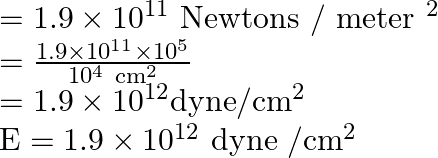Correct answer is c) ![]()
Both Dyne and Newton are force units. While Dyne is measured in the C-G-S (Centimeter – Gram – Second) system, Newton is measured in the contemporary SI system, which yields the Young’s Modulus relationship between stress and strain. It is used to determine the material’s hardness.
Here, stress refers to the force applied per unit area, while strain refers to the object’s deformation.
 Where,
Where, ![]() Stress in Pascal
Stress in Pascal
![]() Strain or deformation
Strain or deformation
![]() Force
Force
![]() Cross sectioned area
Cross sectioned area
![]() Change in Length
Change in Length
![]() Actual Length
Actual Length

Converting it to CGS system, we get,

